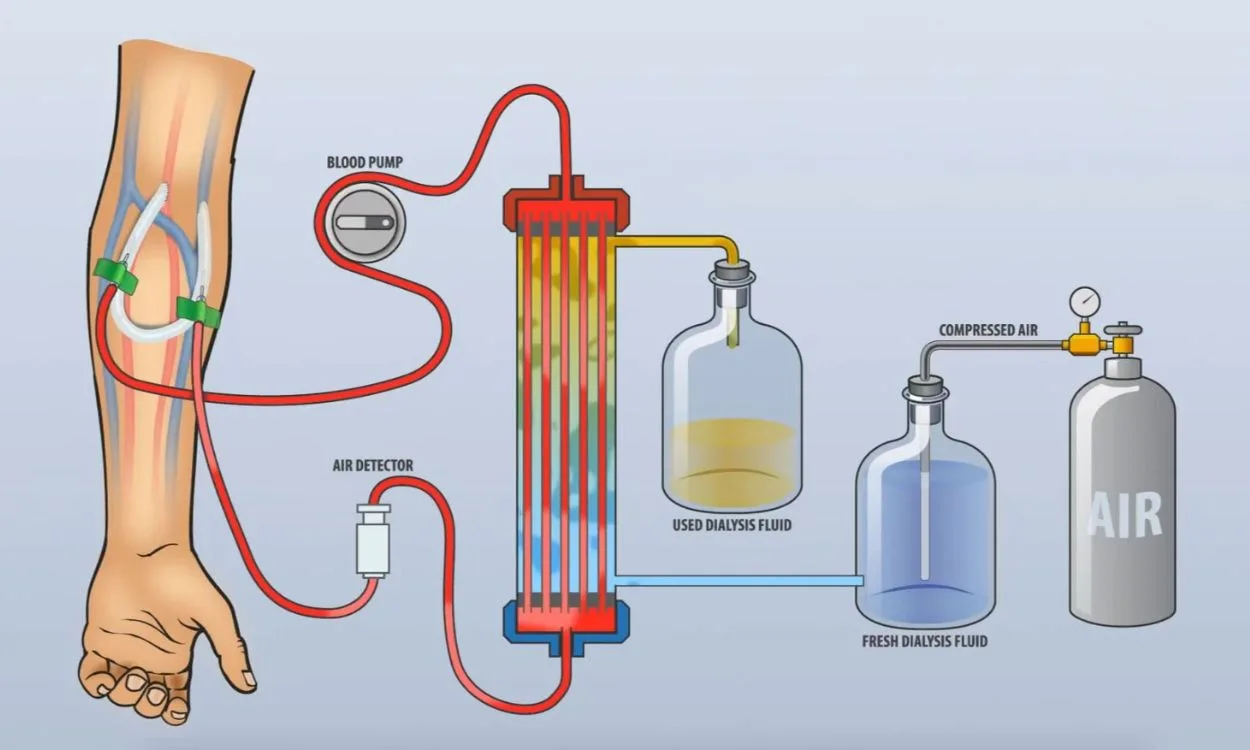What is Hemodialysis and How Does it Work?
Hemodialysis is a medical procedure used to remove waste products and excess fluid from the blood when the kidneys are no longer able to perform their function effectively. It is a life-saving treatment for individuals with end-stage renal disease (ESRD) or acute kidney injury.
Understanding Hemodialysis
Hemodialysis involves the use of a special machine called a dialyzer, also known as an artificial kidney, to filter the blood. The procedure is usually performed in a dialysis center or hospital under the supervision of trained medical professionals.
Here’s how hemodialysis works:
- Access Point: Before starting hemodialysis, a vascular access point is created in the patient’s body. This can be in the form of an arteriovenous fistula (AVF), arteriovenous graft (AVG), or a central venous catheter (CVC). The access point allows for easy and repeated access to the patient’s bloodstream during dialysis.
- Blood Removal: During hemodialysis, the patient’s blood is removed from their body through the access point. If an AVF or AVG is present, two needles are inserted into the access point. One needle carries the blood from the patient to the dialyzer, while the other needle returns the filtered blood back to the patient’s body. If a CVC is used, it has both an inlet and outlet tube for blood circulation.
- Dialysis Machine: The dialysis machine acts as an artificial kidney by mimicking the functions of a healthy kidney. It pumps the patient’s blood through a series of tubes in the dialyzer, which is filled with a special fluid called dialysate. The dialysate removes waste products and excess fluid from the blood, restoring its balance.
- Filtration Process: Inside the dialyzer, the patient’s blood and the dialysate flow in opposite directions, separated by a thin membrane. This membrane allows waste products, such as urea and creatinine, to pass from the blood into the dialysate. At the same time, essential nutrients and electrolytes in the blood are retained.
- Monitoring and Adjusting: Throughout the hemodialysis session, the patient’s vital signs, including blood pressure, heart rate, and oxygen levels, are closely monitored. The dialysis machine is programmed to ensure the removal of an adequate amount of fluid and waste products, while maintaining the stability of the patient’s blood chemistry.
- Duration and Frequency: The duration and frequency of hemodialysis sessions vary depending on the patient’s condition and the severity of their kidney disease. Typically, a session lasts for about 3-4 hours and is performed three times a week. However, this may vary based on the individual’s needs and medical advice.
- Potential Complications: Hemodialysis, like any medical procedure, carries some risks. Possible complications include low blood pressure, muscle cramps, infection at the access site, and clotting in the dialysis tubing. Patients undergoing hemodialysis are closely monitored to detect and address any complications promptly.
Fitpaa and Your Health Journey
While this blog post primarily focuses on explaining hemodialysis, Fitpaa is here to support you in your health and fitness goals beyond managing kidney disease. We believe that everyone deserves to lead a healthy and fulfilling life, regardless of their medical condition.
With the Fitpaa app, you gain access to a comprehensive and personalized health and fitness experience. Our team of experts, including fitness planners, nutritionists, and doctors, is dedicated to helping you achieve your goals with guaranteed results.
Here’s how Fitpaa can assist you:
- Personalized Fitpaa Capsule: Based on your specific needs, lifestyle, and health goals, our expert team will prepare a personalized Fitpaa Capsule. This all-in-one health and fitness plan consists of medical therapy, exercise therapy, nutrition therapy, and cognitive behavior therapy, designed to optimize your metabolism and help you achieve your goals.
- Real-Time Guidance: The Fitpaa app incorporates real-time guidance technology, inspired by cognitive behavioral therapy, to keep you motivated and on track throughout your health journey. With timely nudges and habit-building techniques, you’ll stay inspired and take the necessary actions to achieve your desired results.
- Comprehensive Tools: The Fitpaa app provides a range of tools to support your health and fitness goals. These include a virtual workout trainer, diet tracker, performance tracker, progress tracker, and much more. With these resources at your fingertips, following your Fitpaa Capsule becomes easy and convenient.
- Expert Support: Your progress will be regularly reviewed by our team of fitness planners, nutritionists, trainers, and doctors. They will provide unlimited consultations, daily follow-ups, and weekly reviews to ensure you stay on track and make necessary adjustments to your plan as needed.
In Conclusion, hemodialysis is a crucial medical treatment for individuals with kidney disease, helping them manage their condition and improve their overall well-being. However, Fitpaa goes beyond that, empowering you to take charge of your health and achieve your fitness goals with our comprehensive and personalized approach. Take the first step towards a healthier life by downloading the Fitpaa app today!









